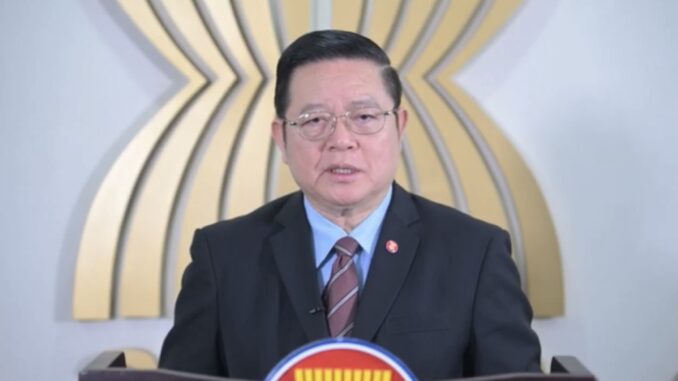
Vientiane, Laos — Association of Southeast Asian Nations Secretary General Dr. Kao Kim Hourn on Monday called for better public engagement in order for the people of the member-countries to appreciate the regional organization.
In his opening remarks during the 8th ASEAN Media Forum, Kao said that while ASEAN has made progress in its public communication over the years, awareness of the initiatives it has done and its impact among the general public remains relatively low in many member states.
“Many citizens are still unaware of how ASEAN directly affects their lives and communities. This highlights the urgent need for enhanced communication strategies to bridge this gap,” he said in a video message to journalists.
“We must do more to inform and engage our peoples about the benefits of regional integration and cooperation, fostering a sense of ownership and pride in our ASEAN identity,” he added.
Kao said it is crucial to foster a sense of belonging among the peoples as the ASEAN advances its community building process.
“Clear communication about what regional integration means—and what it doesn’t—is essential to accurately inform our stakeholders. This underscores the importance of collaboration between the ASEAN Secretariat and the media in raising awareness, promoting understanding, and addressing misconceptions about the ASEAN integration agenda,” he said.
He noted the significance of the ASEAN Media Forum this year, under the chairmanship of Lao PDR, which focuses on enhancing connectivity and resilience.
“By strengthening connections within our region and beyond, we can unlock new opportunities for growth, innovation, and cultural exchange,” he said.
Fake news era
Kao said a crucial part of resilience involves adapting to the present era of information overload and polarized narratives, where conflicting perspectives and misinformation often dominate public spaces.
He added ensuring the effectiveness and integrity of the media has become increasingly vital, yet ever more challenging.
“Traditional media outlets face growing difficulty in reaching audiences effectively, as social media increasingly serves as the primary information source for many, especially younger generations,” he said.
The Secretary-General said with the shift comes the proliferation of misinformation, declining trust in traditional media, and economic pressures that threaten the integrity and independence of journalism.
“Social media has, indeed, democratized access to information, but it has also become a powerful vector for spreading false narratives, complicating the media landscape across the ASEAN region and beyond,” he said.
Quality journalism
In her congratulatory remarks, Nicole Stechmann, Chargée d’affaires of the German Embassy to the Lao PDR, stressed the need for quality journalism.
“The citizens of ASEAN need to be informed about the benefits that regional integration and cooperation offer them. This information is being conveyed to them by quality journalism,” she said.
Nicole Stechmann, Chargée d’affaires of the German Embassy to the Lao PDR, on Monday stressed the need for quality journalism during the 8th ASEAN Media Forum. @gmanews pic.twitter.com/MFZ3aLkIfE
— Amita O. Legaspi (@amitalegaspi) November 25, 2024
She added quality journalism has become the public’s best weapon against the dangers of disinformation.
“Quality journalism does not simply state facts: it investigates, questions, and contextualizes. It digs deeper to reveal not only what happened, but why it matters. This kind of journalism educates, empowers, and most importantly, protects,” said Stechmann.
She further said it fosters a society that is well-informed, not easily swayed by sensationalism or half-truths, but guided by a sound understanding of the issues at hand. —AOL/RSJ, GMA Integrated News


Be the first to comment